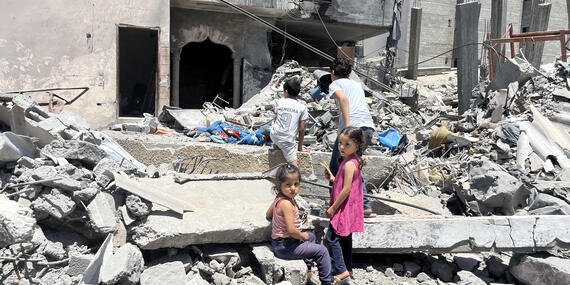Today's top news: Occupied Palestinian Territory, Ukraine, Haiti

Occupied Palestinian Territory
OCHA warns that active fighting, access restrictions and other major obstacles continue to undermine efforts to address the deepening humanitarian crisis in Gaza. OCHA underscores once again that reaching people in need wherever they are in Gaza hinges on safe, sustained and unimpeded access for aid organizations.
The World Food Programme (WFP) reports that since the Rafah incursion more than a month ago, deliveries to southern and central areas of Gaza have plummeted – though the agency has been able to increase deliveries to the north.
WFP says insecurity, access restrictions and damaged infrastructure continues to hamper ongoing efforts to move food safely into and within Gaza.
Despite these obstacles, the agency was able to reach about 1 million people in May, though WFP was forced to reduce rations.
Food prices remain exorbitant in Gaza. Availability in Deir al Balah and Khan Younis has increased, but food is still too expensive for the average person to afford.
Meanwhile, the World Health Organization (WHO) say they are working with partners to meet rising health needs in southern Gaza by supporting the gradual expansion of services at Nasser Medical Complex.
WHO stresses that Nasser and other hospitals in Gaza need ongoing support to stay functional. However, without the sustained flow of aid into and across Gaza, as well as unimpeded access for humanitarian operations, efforts to resupply hospitals remain extremely challenging.
Ukraine
Ukraine's Humanitarian Coordinator, Denise Brown, condemned in a statement yesterday the deadly attack on the densely populated city of Kryvyi Rih, in the south of the country.
According to authorities and humanitarian workers on the ground, the attack hit a residential area, killing and injuring civilians, including children.
Education facilities and numerous apartment buildings were also damaged.
Humanitarian workers are on site providing psychological support as well as materials for the quick repair of damaged homes.
Haiti
Aid organizations continue to support people displaced by violence in Haiti's capital Port-au-Prince.
Between 8 and 12 June, the World Food Programme distributed more than 40,000 hot meals to over 9,000 displaced people in Port-au-Prince. Since the beginning of the year, WFP has distributed more than 1.1 million hot meals to over 120,000 displaced people.
In May, the UN Population Fund supplied 900 dignity kits to women and girls. It also deployed 8 mobile clinics providing sexual and reproductive health and gender-based violence services and support. UNFPA’s hotline offering psychosocial support received more than 160 calls in May.
Humanitarian partners continue to sound the alarm on the deteriorating situation in Haiti’s southern regions, where more than 268,000 people are now displaced. This represents a 95 per cent increase since March.
Meanwhile, the health system continues to face serious challenges, crippled by both the recent violence and years of lack of investment. Currently, just 20 per cent of health facilities in Port-au-Prince are functioning normally.
This year's Humanitarian Response Plan, which calls for US$674 million, is just 23 per cent funded at $156 million.
